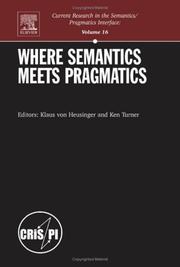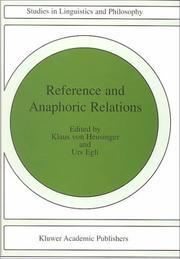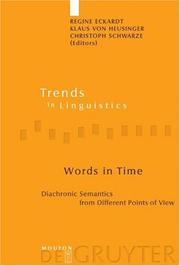| Listing 1 - 10 of 14 | << page >> |
Sort by
|

ISBN: 9780080449760 008044976X 9786610628407 1280628405 008046260X 9780080462608 Year: 2006 Publisher: Amsterdam Elsevier
Abstract | Keywords | Export | Availability | Bookmark
 Loading...
Loading...Choose an application
- Reference Manager
- EndNote
- RefWorks (Direct export to RefWorks)
The Current Research in the Semantic / Pragmatics Interface series has carved out a new and vibrant area of research. This volume offers the reader a state-of-the-art record of new and established research in this area. Von Heusinger and Turner's careful selection of topics and contributors ensures that each chapter integrates semantic and pragmatic facts into a single theory, that each finds an adequate division of theoretical labour and that each attempts to design and corroborate an elegant account of meaning and use that would be compatible with other aspects of human behaviour. Importantly, each paper in the volume focuses on linguistic detail, not merely abstract discussions of a theoretical nature. Thus each paper makes extensive reference to the semantic and pragmatic facts of English and also other languages. This reference gives each of the proposed analyses a more adequate empirical edge and a sharper theoretical focus. This book is a must for all scholars and students interested in the new and vibrant discipline of semantics-pragmatics and to anyone who is fascinated by the prospect of working beyond the traditional disciplinary boundaries of linguistics and the philosophy of language. The chapters in this volume originate from a workshop at the Linguistic Society of America Summer Institute, held at Michigan State University.
Lexicology. Semantics --- Pragmatics --- Semantics (Philosophy) --- General semantics --- Language and languages --- Logic, Symbolic and mathematical --- Philosophy

ISBN: 0792360702 1402002912 9401139474 Year: 2000 Volume: 72 Publisher: Dordrecht Kluwer
Abstract | Keywords | Export | Availability | Bookmark
 Loading...
Loading...Choose an application
- Reference Manager
- EndNote
- RefWorks (Direct export to RefWorks)
This book is a collection of original research articles on the representation and in terpretation of indefinite and definite noun phrases, anaphoric pronouns, and closely related issues such as reference, scope and quantifier movement. A variety of frame works for the formal analysis of discourse semantics are represented, including dis course representation theory, file change semantics, dynamic Logic, E-type theories, and choice function approaches, which was one of the main issues the Konstanz project were concerned with. All of these frameworks are couched in the tradition of Montague Grammar, even though they extend the classical formalism in different directions. The developments emerged from the modern discussion of problems for the representation of cross-sentential anaphoric relations involving pronouns, and the interpretation of definite and indefinite noun phrases. After a decade of controversy, these approaches are merging together, enriching each other's formal mechanisms rather than expressing opposition. Thus, the articles in this volume concentrate on fundamental semantic questions, and also extend the current formalisms in order to capture more data. The roots of this book lie in the workshop "Reference and Anaphoric Relations", which was held at the University of Konstanz in June 1996. Five main issues were discussed: (i) the Stoic and scholastic treatment of reference and anaphora; (ii) quan tification and scope, (iii) anaphoric reference; (iv) the representation of indefinite NPs with choice functions; and (v) the relation between linguistic expressions, their rep resentations and their meanings.
Reference (Linguistics) --- Anaphora (Linguistics) --- Definiteness (Linguistics) --- Grammar, Comparative and general --- Référence (Linguistique) --- Anaphore --- Définis (Linguistique) --- Quantificateurs (Linguistique) --- Quantifiers --- Anafoor (Taalwetenschap) --- Anaphore (Linguistique) --- Verwijzing (Taalwetenschap) --- Quantifiers. --- Definiteness (Linguistics). --- Reference (Linguistics). --- Philosophy of language --- Anaphora (Linguistics). --- Grammar [Comparative and general ] --- Semantics. --- Linguistics. --- Language and languages—Philosophy. --- Artificial intelligence. --- Theoretical Linguistics. --- Philosophy of Language. --- Artificial Intelligence. --- AI (Artificial intelligence) --- Artificial thinking --- Electronic brains --- Intellectronics --- Intelligence, Artificial --- Intelligent machines --- Machine intelligence --- Thinking, Artificial --- Bionics --- Cognitive science --- Digital computer simulation --- Electronic data processing --- Logic machines --- Machine theory --- Self-organizing systems --- Simulation methods --- Fifth generation computers --- Neural computers --- Linguistic science --- Science of language --- Language and languages --- Formal semantics --- Semasiology --- Semiology (Semantics) --- Comparative linguistics --- Information theory --- Lexicology --- Meaning (Psychology)

ISBN: 9781402061974 9781402061981 9781402061967 Year: 2007 Volume: 84 Publisher: New York : Springer,
Abstract | Keywords | Export | Availability | Bookmark
 Loading...
Loading...Choose an application
- Reference Manager
- EndNote
- RefWorks (Direct export to RefWorks)
This collection is an important contribution to the semantic and syntactic analysis of the expression of existence. The volume focuses on the three main linguistic constructions expressing existence: copular clauses, existential sentences, and (in)definiteness. The papers analyze the interaction between the basic notion of existence and pervasive phenomena of natural language, such as quantification and presupposition. The contributions represent state of the art research on theoretical and comparative issues related to the expression of existence, and make extensive reference to the semantic and syntactic facts of English and of various other languages. The richness of new data and the juxtaposition of different theoretical stances bring a number of new questions into focus.
Grammar --- taalfilosofie --- Lexicology. Semantics --- syntaxis --- semantiek --- linguïstiek --- Grammar, Comparative and general --- Semantics, Comparative. --- Phrase existentielle --- Syntaxe --- Sémantique comparée --- Existential constructions --- Syntax. --- EPUB-LIV-FT LIVLANGU SPRINGER-B
Book
Abstract | Keywords | Export | Availability | Bookmark
 Loading...
Loading...Choose an application
- Reference Manager
- EndNote
- RefWorks (Direct export to RefWorks)
Digital
ISBN: 9781402061974 9781402061981 Year: 2008 Publisher: Dordrecht Springer
Abstract | Keywords | Export | Availability | Bookmark
 Loading...
Loading...Choose an application
- Reference Manager
- EndNote
- RefWorks (Direct export to RefWorks)
Lexicology. Semantics --- Grammar --- semantiek --- syntaxis --- linguïstiek --- taalfilosofie

ISBN: 3110176750 3110899973 Year: 2003 Volume: 143 Publisher: Berlin Mouton de Gruyter
Abstract | Keywords | Export | Availability | Bookmark
 Loading...
Loading...Choose an application
- Reference Manager
- EndNote
- RefWorks (Direct export to RefWorks)
Meanings of words are constantly changing, and the forces driving these changes are varied and diverse. Linguistic analyses are usually concerned with language-internal processes, while investigations of language-external historical developments tend to disregard linguistic considerations. It is evident, however, that an investigation of diachronic semantics will have to consider both sides: a specific theory of meaning including a proper place for lexical semantics on the one hand, and incorporate knowledge about the world and the social and cultural environment of speakers who use language as a tool for communication on the other. The collection focuses on meaning change as a topic of interdisciplinary research. Distinguished scholars in diachronic semantics, general linguistics, classical philology, philosophy of language, anthropology and history offer in depth studies of language internal and external factors of meaning change. This broad range of perspectives, unprecedented in research publications of recent years, is a pioneering attempt to mirror the multi-facetteous nature of language as a formal, social, cognitive, cultural and historical entity. The contributions, each exploring the research issues, methods and techniques of their particular field, are directed towards a broader audience of interested readers, thus enhancing interdisciplinary exchange.
Lexicology. Semantics --- Historical linguistics --- Semantics, Historical --- Sémantique historique --- Semantics, Historical. --- Historical semantics --- Historical lexicology --- Semantics. --- Formal semantics --- Semasiology --- Semiology (Semantics) --- Comparative linguistics --- Information theory --- Language and languages --- Lexicology --- Meaning (Psychology)
Book
ISBN: 9789004473324 9789004473317 9004473327 Year: 2022 Publisher: Leiden Brill
Abstract | Keywords | Export | Availability | Bookmark
 Loading...
Loading...Choose an application
- Reference Manager
- EndNote
- RefWorks (Direct export to RefWorks)
This volume explores the interface between morphosyntax and semantics-pragmatics in the domain of referential and quantificational nominal expressions. We present case studies from Romance and Germanic languages, dealing with both synchronic and diachronic aspects. Our aim is to empirically test, on the basis of comparative data, the most recent theoretical developments in the analysis of reference and quantification and to identify focal points for future research.
Semantics --- Formal semantics --- Semasiology --- Semiology (Semantics) --- Comparative linguistics --- Information theory --- Language and languages --- Lexicology --- Meaning (Psychology) --- Grammar, Comparative and general --- Reference (Linguistics) --- Romance languages --- Germanic languages --- Determiners. --- Quantifiers. --- Grammar --- Linguistics --- Philology --- Signification (Linguistics) --- Onomasiology --- Determiners --- Quantifiers --- Quantifiers (Linguistics) --- Determinatives (Linguistics) --- Determiners (Linguistics) --- Classifiers (Linguistics) --- Definiteness (Linguistics)
Book
ISBN: 9783110587210 Year: 2019 Publisher: Berlin ; Boston : De Gruyter Mouton,
Abstract | Keywords | Export | Availability | Bookmark
 Loading...
Loading...Choose an application
- Reference Manager
- EndNote
- RefWorks (Direct export to RefWorks)
Grammar, Comparative and general --- Semantics. --- Grammaticalization.
Book
Year: 2011 Publisher: Berlin De Gruyter Mouton
Abstract | Keywords | Export | Availability | Bookmark
 Loading...
Loading...Choose an application
- Reference Manager
- EndNote
- RefWorks (Direct export to RefWorks)
Book
ISSN: 14727870 ISBN: 9789004378315 9004378316 9004378324 9789004378322 Year: 2019 Volume: 36 Publisher: Leiden Brill
Abstract | Keywords | Export | Availability | Bookmark
 Loading...
Loading...Choose an application
- Reference Manager
- EndNote
- RefWorks (Direct export to RefWorks)
The volume Questions in Discourse - Vol. 2 Pragmatics collects original research on the role of questions in understanding text structure and discourse pragmatics. The in-depth studies discuss the effects of focus, questions and givenness in unalternative semantics, as well as the role of scalar particles, question-answer pairs and prosody from the perspective of Questions under Discussion. Two contributions compare the discourse-structuring potential of Questions under Discussion and rhetorical relations, whereas another adds a perspective from inquisitive semantics. Some contributions also look at understudied languages. Together, the contributions allow for a better understanding of question-related pragmatic and discourse-semantic phenomena, and they offer new perspectives on the structure of texts and discourses.
Grammar, Comparative and general --- Pragmatics. --- Question (Logic). --- Interrogative. --- Question (Logic) --- Pragmatics --- Interrogative --- Grammar, Comparative and general - Interrogative --- General semantics --- Language and languages --- Logic, Symbolic and mathematical --- Semantics (Philosophy) --- Philosophy
| Listing 1 - 10 of 14 | << page >> |
Sort by
|

 Search
Search Feedback
Feedback About UniCat
About UniCat  Help
Help News
News